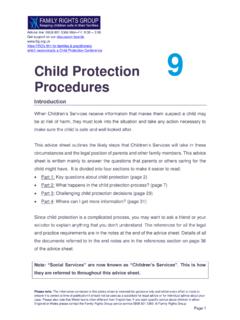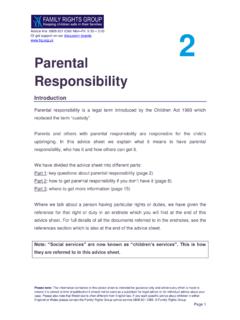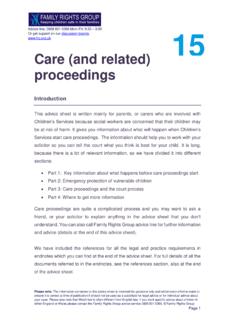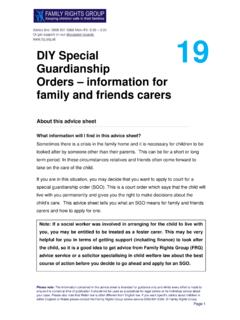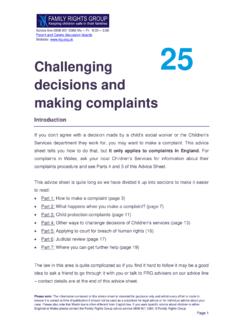Transcription of Special Guardianship: what does it mean for birth parents?
1 Please note: The information contained in this advice sheet is intended for guidance only and whilst every effort is made to ensure it is correct at time of publication it should not be used as a substitute for legal advice or for individual advice about your case. Please also note that Welsh law is often different from English law. If you want specific advice about children in either England or Wales please contact the Family Rights Group advice service 0808 801 0366. Family Rights Group Page 1 Special guardianship : what does it mean for birth parents ?
2 Introduction Sometimes circumstances arise in which children are not able to live with their parents and have to be cared for by someone else - it may be a relative or friend or it could be a foster carer who works for the Council. These arrangements may be for a short or long period, and may be made by the parents and the new carer directly or a social worker may be involved. If there is a plan for your child to live with someone else for a long time, the arrangement may be secured legally by a court order.
3 This could be achieved by: a Child Arrangements Order (saying who the child should live with) - you can get more information about what this means if you call Family Rights Group (FRG) advice service (contact details in Part 4 of this advice sheet); or a Special guardianship Order (SGO) if the arrangement is likely to continue until your child is 18 and the new carer is not your child s other parent. The key differences between these two orders and other relevant legal options for children living away from their parents can be found in Appendix 1.
4 This advice sheet sets out the key features of a Special guardianship order and explains how it may affect your position as a birth parent. It is quite long so we have divided it into sections to make it easier to read: 20 advice line: 0808 801 0366 Mon Fri: 9:30 3:00 Or get support on our discussion boards. Please note: The information contained in this advice sheet is intended for guidance only and whilst every effort is made to ensure it is correct at time of publication it should not be used as a substitute for legal advice or for individual advice about your case.
5 Please also note that Welsh law is often different from English law. If you want specific advice about children in either England or Wales please contact the Family Rights Group advice service 0808 801 0366. Family Rights Group Page 2 Part 1: gives basic information about Special guardianship (page 4) Part 2: gives information about Special guardianship order and the court process (page 8) Part 3: gives information about getting help when a Special guardianship order exists (page 16) Part 4: suggests where you can go for more information (page 20).
6 Since things can seem quite complicated when Children s Services are involved with your family, you may want to ask a friend or your solicitor to explain anything in the advice sheet that you don t understand. You can also talk to Family Rights Group advisers on our advice line you can find FRG advice line contact details in Part 4 of this advice sheet. We have included the legal and practice requirements in endnotes at the end of the advice sheet. For full details of all the documents referred to in the endnotes, see the References section at the end of the advice sheet.
7 Note: Social services are now known as Children s Services . This is how they are referred to throughout this advice sheet. Key terms used in this advice sheet include: Parental responsibility: parental responsibility means the legal right to make decisions about how a child is raised. Those with parental responsibility include: mothers fathers who have been married to the mother at any time since the birth of the child; or who are jointly registered on the birth certificate as the father after.
8 Or have acquired PR by formal agreement with the mother or by court order anyone who has a Residence/Child Arrangements Order saying the child should live with them, a Special guardianship Order or an Adoption Order in their favour on the child Please note: The information contained in this advice sheet is intended for guidance only and whilst every effort is made to ensure it is correct at time of publication it should not be used as a substitute for legal advice or for individual advice about your case.
9 Please also note that Welsh law is often different from English law. If you want specific advice about children in either England or Wales please contact the Family Rights Group advice service 0808 801 0366. Family Rights Group Page 3 testamentary guardians ( a person who is appointed to care for a child after the death of a parent who has parental responsibility or the death of a Special guardian) step- parents who have acquired PR by formal agreement or court order. For more information about parental responsibility, see FRG advice sheet Parental Responsibility: Looked after: Your child is "looked after" if they are being cared for by Children s Services, away from home.
10 This will either be: with your agreement, or the agreement of your child s other parent or anyone else with parental responsibility or the agreement of the child themselves if they are aged 16 or 17. This is known as accommodation ; or under a court order such as a Care Order or Emergency Protection Order. This is known as in care . When your child is looked after, they may be placed with the other parent, someone else who has parental responsibility, relatives or friends, unrelated foster carers or in a residential unit.
